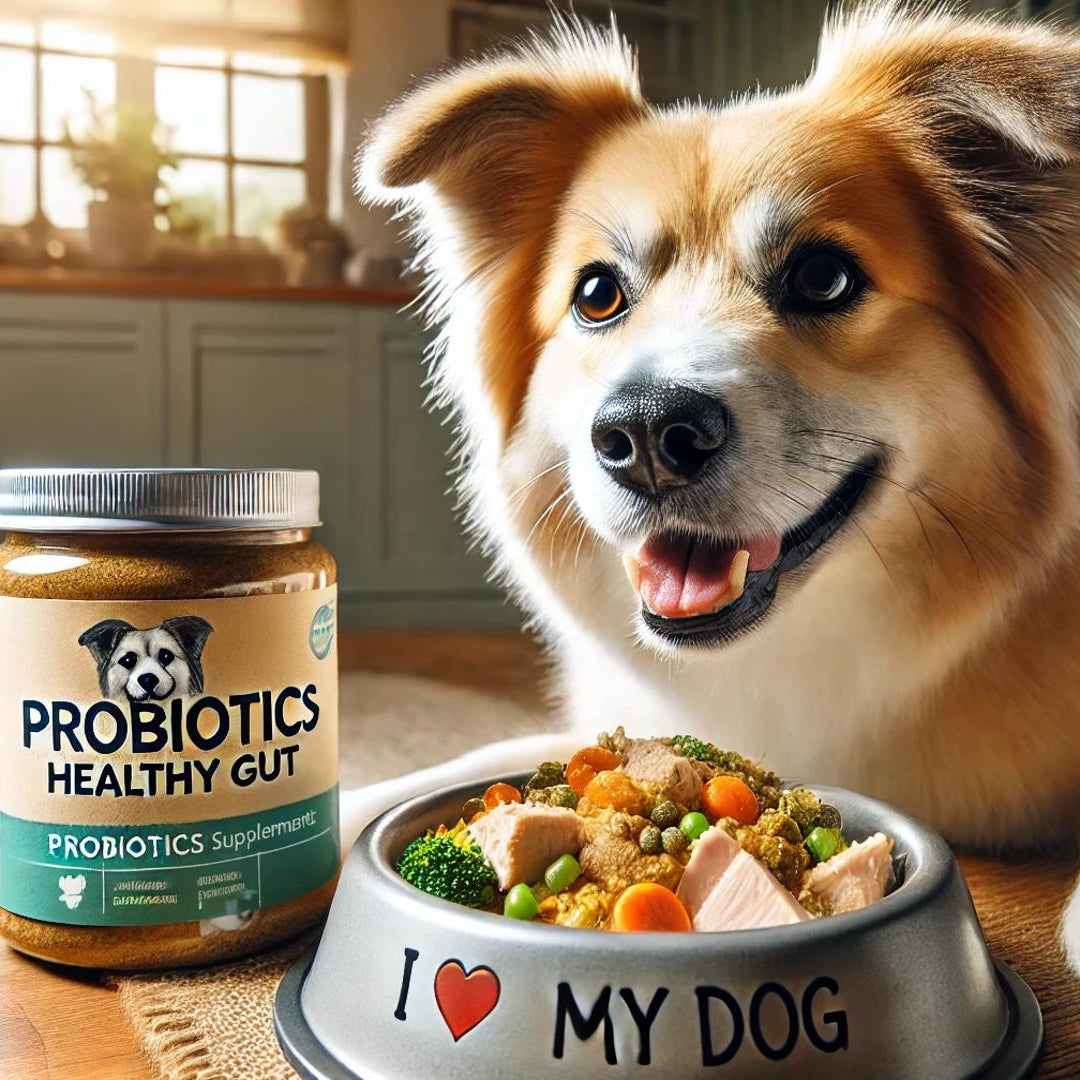What, When & How To Help Your Pup Thrive
We have all heard the buzz about gut health for people, but what about our dogs? Like humans, a dog’s overall health relies on a delicate balance of good bacteria.
You’ve likely eaten probiotic-rich yogurt with live cultures before. These live microorganisms also offer various health benefits for our furry companions. These friendly microbes reside in the gastrointestinal system and work wonders, from boosting digestion to enhancing immunity. This article will go in-depth about probiotics for dogs, looking closer at their use, benefits, and considerations.
Understanding Dog Probiotics
A dog's digestive system has a unique mixture of good and bad bacteria, called the microbiome. It's a diverse ecosystem essential for healthy bodily functions. An ideal gut microbiome plays a critical role in a dog’s well-being. A decline in these helpful bugs can lead to stomach problems. In humans, this good-to-bad bacteria imbalance is referred to as dysbiosis. Although we might not notice our dog showing outward signs of this dysbiosis, it could lead to disease.
What if your dog's healthy gut microflora balance goes haywire due to various stressors? This disruption can open the door to all kinds of digestive health issues - from chronic diarrhea, gas, constipation, and inflammatory bowel disease to allergies, skin problems, and compromised immunity. Probiotic supplements help restore balance and build up good bacteria levels in the dog's microbiome.
What, When, and How?
What should you look for in a probiotic supplement? Some of the top beneficial bacteria strains are Lactobacillus acidophilus, Enterococcus faecium, Bifidobacterium lactis, Lactobacillus casei, and Bifidobacterium breve. Each one functions separately to balance different gut issues.
These gut issues can be caused by stressors such as diet changes, moving, traveling, and kennel stays. A dog’s age is another factor to consider when considering probiotic needs. A compromised immune system is another.
We recommend you rotate probiotic supplements for optimal digestive health. This rotation helps avoid a common issue – creating an overgrowth of the same bacteria. Commercially manufactured dog foods with added probiotics use the same strain. If you are committed to only one brand, you're contributing to an imbalance of bacteria rather than preventing one. Balance is created when you use multiple strains of probiotics for your dog.
Not all beneficial bacteria must be live. Dr. Karen Becker points out in a recent article on probiotics for stressed dogs published on Healthypets.substack.com. Scientists now know sterile filtrates, those having no living bacteria, still offer health benefits.
To select an effective probiotic for dogs, pay close attention to the label. It should have an expiration date, strain identification of bacteria, a guarantee of a minimum number of living bacteria, and instructions for proper care of the product. Live bacteria strains are susceptible to damage by temperature extremes.
Choosing the Best Probiotic for Dogs
With a wealth of products on the market promising a world of gut health benefits, selecting the best probiotic for your dog can be challenging. When making your selections, remember a couple tips from above:
Consider the Strain
There are several strains of beneficial gut bacteria, and some have proved effective in addressing canine anxiety, weight, and stool. Research shows Bifidobacterium animalis can help address the length a dog might suffer from diarrhea. Studies using Bifidobacterium longum (BL999) indicate positive results for overall dog anxiety in nearly 90% of the dogs given a probiotic. In fact, most were less reactive when put into environments in which they were typically anxious.
Read the Label
Probiotic formulas can use various bacteria species. Each can have distinct properties for specific conditions and benefits. They must have clear information listed about CFUs, strain IDs (genus, species, strain number), manufacturing location, the presence or absence of prebiotics, a guaranteed analysis, use by dates and storage directions. This ensures the effectiveness of these delicate products.
More CFUs or a lot of strains in one formula does not always equate to better. The manufacturer should be able to back up its effectiveness for gut issues like inflammatory bowel disease, diarrhea, yeast overgrowth and other ailments. Look for a trusted brand known for being effective in research. Incorporating fermented veggies and raw produce like pumpkin into your dog’s meals can provide supplemental support along with probiotics.
Finding the Best Match for Your Dog's Lifestyle
Probiotics for dogs come in powders, capsules, and chewables. Choose what is right for your own pet and lifestyle. Keep in mind powders can lose potency after sitting for a few weeks due to the live bacterial load being damaged. If you regularly use antibiotics on your pup, consider following antibiotic therapy with daily dog probiotic supplementation. It can take up to one year to help those healthy gut bugs return to the gut tract. Antibiotic overuse can have an impact on a dog's natural immune response and microflora, says Healthypets.
Alternatively, fresh foods help feed and create healthy gut bugs with good bacterial composition. This can build a gut microbiome naturally, without added probiotic supplement support. A diet based on commercial kibble could be supplemented with soil-based probiotic (sporebiotics) chews or capsules. Rotate between different prebiotic bacterial based brands. Incorporate organic fresh food toppers like Jerusalem artichoke, medicinal and culinary mushrooms, and a variety of raw apiaceous vegetables (for example carrots, parsnips, celery, and fennel). Beneficial micro-building fibers help achieve a naturally healthy gut. Finally, give lots of outdoor time so your pup can safely enjoy and eat those healthy soils through sniffing and other normal behaviors. This is one more way to improve their internal and external microbial landscape.
FAQs about Probiotics for Dogs
You may still have additional questions. As probiotics for dogs get increasingly popular, it's important to separate fact from hype. We’ve compiled some frequently asked questions and answers. This should shed light on common concerns regarding these amazing live microorganisms.
Should I give my dog a probiotic?
If your furry friend experiences digestive upset, then talk to your veterinarian about giving them probiotics for dogs. Vets are excellent at suggesting which is best. Vets don't have all the answers, so do your research and discuss it with them. Whether you choose probiotics or not, your dog will need a check-up. Blood, fecal, and urine testing are still important if their gut microbiome changes, regardless of probiotics.
What type of probiotic for dogs is best?
Don't use probiotics meant for humans. The formulations don’t offer the specific benefit of good bacteria for dogs’ intestinal health and could exacerbate gut issues. While there’s not a standard one best for all dogs, seek ones containing Lactobacillus acidophilus, Enterococcus faecium, Bifidobacterium lactis, Lactobacillus casei, and Bifidobacterium breve, because they all naturally live inside dogs.
Beyond choosing from different strains of beneficial microbes, commercially available dog probiotics are offered in a variety of easy-to-eat forms. These are the three most popular:
| Type of Probiotic | How to Give | Pros vs Cons |
| Powder | Mix into your dog's meal. | Pros: Often the most affordable form. Cons: Picky pups may detect powder added into food The powder format can lose potency when exposed to moisture. |
| Capsule | Give to the dog directly or disguise with a tasty dog treat. You can also open the capsule and sprinkle onto their food. |
Pros: Considered the most effective delivery method Cons: May be harder to get a picky eater to eat. More expensive than powder.
|
| Chewable Tablet | Given to the dog as a yummy treat. | Pros: Easily mistaken for dog treats Cons: Can include lots of artificial flavorings. May crumble. |
How do you know if your dog needs a probiotic?
If your furry friend seems stressed because they are going to the kennel, taking a trip, starting a new medication, or dealing with some changes in their life - then ask your vet about dog probiotics for supplemental support. Changes in their GI tract could be telling of other problems. While probiotics are helpful for general intestinal health, especially if they’ve recently needed antibiotics or other medicines, they cannot fix more serious conditions.
Is Greek yogurt a good probiotic for dogs?
Greek yogurt does not offer any live cultures that help a dog’s microbiomes thrive. Opt for a supplement instead. Probiotics are often available for purchase in different forms that have already been designed with their species in mind.
Final Thoughts
With an increased understanding of the importance of gut health to a dog's overall health, probiotics for dogs have emerged as an indispensable tool to boost your dog's well-being. Their positive impact on managing digestive problems like chronic diarrhea, bacterial imbalances, and stress make probiotics an invaluable addition to any loving pet parent's toolkit for achieving overall health and better behaviors. This information is designed to help make sure our furry friends get what they need: the healthy, good gut bacteria that will keep them happy for a lifetime.





